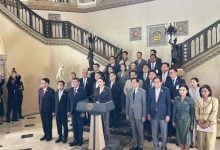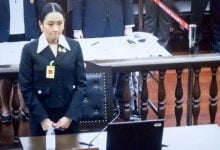MFP Pita to face court on January 31

The Constitutional Court has slated January 31 to give its ruling in the case against former Move Forward Party (MFP) leader Pita Limjaroenrat and the party itself.
The stakes are high, with accusations flying that they aimed to dismantle Thailand’s constitutional democracy, placing the revered King as the head of state, through a controversial election campaign seeking to amend the lèse-majesté law.
The petition, wielded like a legal sword, was unsheathed by Teerayut Suwankesorn, a former lawyer for the infamous monk Suwit Thongprasert, widely known as Buddha Issara. Teerayut alleges that Move Forward’s campaign to amend Section 112 of the Criminal Code, the lèse-majesté law, is a blatant violation of Section 49 of the constitution.
In the hot seat yesterday, December 25, were Pita, now the advisory chairman of MFP, and Chaithawat Tulathon, the party’s leader. Facing the crucible of cross-examination, their political fate hangs in the balance as the court decisively set 2pm on January 31 for its final ruling.
Before taking the stand, Pita staunchly defended his party’s controversial policy, asserting its legality and constitutionality. He insisted that Move Forward had no intentions of toppling the country’s administration and pledged to elucidate the policy’s intricacies in court. Pita passionately argued that the proposed amendments were a strategic move to pacify the ongoing political crisis, vehemently denying any ulterior motives.
“I do not worry that the ruling in this case could lead to another petition for the party to be dissolved. I have no idea who would do that; it’s a matter of the future.”
Chaithawat echoed Pita’s sentiments, insisting that the petition only aimed to halt the party’s proposal to amend Section 112. When asked about the party’s response if the court ordered them to abandon the controversial policy, Chaithawat remained coy, stating he would scrutinise the ruling before making any decisions, reported Bangkok Post.
Teerayut, the petitioner, expressed satisfaction with the court’s proceedings. However, when probed about the possibility of filing another petition to dissolve the MFP if the court ruled in his favour, he maintained a level-headed stance. He clarified that the petition’s primary objective was to thwart any potential violation of the royal institution, firmly asserting that dissolution was not the goal.
Latest Thailand News
Follow The Thaiger on Google News:


























